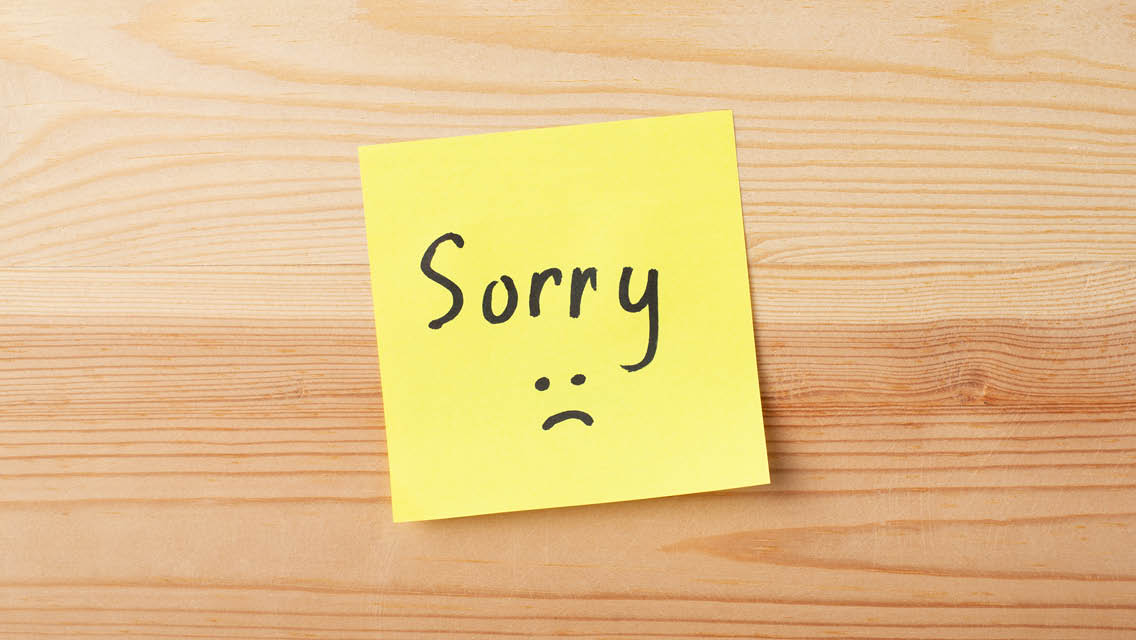APOLOGY LANUGUAGE SHORTCUTS
1. Expressing Regret | 2. Accepting Responsibility | 3. Making Restitution | 4. Planning Change | 5. Requesting Forgiveness | When Not to Apologize
Maybe you have a good friend who is always late. You wish she would just once apologize for it. Perhaps she does apologize, but you’re sure that if she really meant it, she would be on time. Or you’re happy to forgive her for making you wait an hour at the restaurant — as long as she picks up the check.
In these cases, you’re waiting for an apology that feels sincere — to you.
Such apologies can mend a fence, deepen a relationship, and even help with healing a stress-induced health condition. Yet despite their almost miraculous restorative power, genuine apologies rarely come easily.
Psychologist Molly Howes, PhD, author of A Good Apology: Four Steps to Make Things Right, describes earnest apologies as both seemingly “too hard to do, and too important not to do.”
Sincere apologies are difficult for myriad reasons. We’re likely to feel guilt and shame about the offense. Perfectionism can make even admitting a mistake excruciating — forget being able to find the humility a genuine apology requires.
Given these obstacles, most of us are unlikely to have witnessed many good apologies when we were kids. This all adds to the confusion and resistance we might feel when attempting to offer amends — even when we know we’re wrong.
That is, if we do. We often have no idea we’ve hurt someone’s feelings.
Our occasional (or chronic) oblivion also makes sense in context. If mistakes weren’t well-tolerated in our childhood homes, it can be frightening to admit errors as an adult; denial may be an unconscious, self-protective habit.
Howes also believes we’re at least partly hardwired to remain unaware of our wrongdoings. “Our brains are really good at being streamlined and efficient, which is not great for noticing how we affect the other person in our relationships,” she notes.
Indifference requires less energy from our brains than reviewing our behavior and considering other perspectives does. Yet when efficiency means blowing past the hurt look on your loved one’s face, there are other prices to pay.
“The good apology,” Harriet Lerner, PhD explains, “earns us the respect of others, who can trust us to orient toward reality, admit error, and set things right. The courage to apologize, and the wisdom to do so wisely and well, is at the heart of having good relationships and a solid self.”
Thankfully, we can choose to become more conscious of mental habits like denial, impatience, and perfectionism. It takes effort, but even if we struggle with apologies, we can learn to muster up the courage, set aside our ego, and admit we were wrong.
Most of us have managed this at some point in our lives and have reaped the rewards. In the best-case scenario, the hurt party accepts our contrition, and the relationship is reconciled.
But then there are other scenarios. Sometimes our words or actions don’t land well (or, to everyone’s dismay, make things worse) and the relationship remains splintered. We may try and try, but the hurt simply can’t be soothed. At these moments it can feel as if we’re speaking a completely different language than the person we’re trying to reach.
According to Gary Chapman, PhD, and Jennifer Thomas, PhD, that could be the case. In their book, The Five Apology Languages: The Secret to Healthy Relationships, Chapman and Thomas posit that everyone has one primary “apology language” they respond to best.
“Each [apology language] is important,” Thomas notes. “But . . . one or two of the languages may show your sincerity more effectively than the others.”
In short, when we say we’re sorry using a person’s primary language of apology, they can actually hear it. This makes it much easier for them to accept the apology as genuine.
But when we fail to speak someone’s language, it can be almost impossible for them to trust the amends we’ve offered, regardless of their sincerity.
The outlines of this concept may sound familiar. That’s because Chapman is also the author of The Five Love Languages, and the two books are founded on the same basic idea: We create harmony by adapting to the preferred communication style of our loved ones.
When we speak someone’s love language, for example, that person is more likely to feel loved than if we communicate in a different way. (The five love languages are words of affirmation, quality time, physical touch, acts of service, and receiving gifts. For more, see “The 5 Love Languages“.)
Likewise, when we speak someone’s apology language — by expressing regret, accepting responsibility, making restitution, planning change, or requesting forgiveness — they’re more apt to feel sincerely acknowledged.
Understanding apology languages can help our amends reach the person we care about, so we’re more likely to help resolve a dispute and heal a fracture. And understanding our own primary apology language(s) can help us get clarity when it’s hard to let go of a conflict. It sets us up to ask directly for what we need when some else’s apology feels incomplete.
The 5 Apology Languages
We tend to give apologies the way we like to receive them. Noting how you typically apologize (by asking for forgiveness, say, or making a gesture of repayment) is a good way to decipher your own apology language.
Identifying another person’s apology language is more challenging, though observing them can help guide you. How does that person apologize to others? What do they do or say?
If you’ve never had a chance to witness their apology style, think about what pleases them. If you’re in a relatively close relationship, you can also discuss what they need from an apology, or even take the online quiz together here.
The most important thing to understand about apology languages is that they represent a diversity of needs. What you require from an apology may not be the same as what your partner, your child, or your best friend requires.
When in doubt about some-one’s apology language, or when you’re stuck in a conflict and your apology isn’t landing, it never hurts to offer an apology that draws on all the languages: Be sincere, accept responsibility, offer to fix the problem, make a plan for the future, and leave it up to the other person to decide whether all of this is enough to warrant forgiveness.
Each of these efforts demonstrates an honest commitment to righting a wrong, and that’s something all true apologies have in common.
1. Expressing Regret
If you find yourself needing to hear the words “I’m sorry” for an apology to feel complete, then expressing regret may be your apology language. An expression of regret entails more than saying one is sorry; it also denotes specifically what action has spurred the regret. A statement that starts with “I’m sorry that I . . .” and names the regrettable action is a fluent expression of this apology language.
If you catch yourself including “but” or “if” in your apology, stop and rephrase. Mixed messages such as “I’m sorry, but I didn’t mean to offend you,” or “I’m sorry if you misinterpreted what I said,” puts the onus on the hurt person.
So rather than “I’m sorry I yelled at you, but you made me feel overwhelmed,” try something simpler: “I’m sorry that I yelled at you, and I wish I hadn’t done that.”
Another way to show sincerity, suggest Chapman and Thomas, is to align your tone and your body language with your words. If you’re yelling, “I’m sorry, OK?!” while your eyes are blazing with anger, your apology will (unsurprisingly) not seem sincere.
And while it might be tempting to toss out a thoughtless “I’m sorry” simply to end a discussion, know that it will ring false. If you need a break from an argument, say so directly and take one. Wait to apologize until you’re calm.
Starter phrases:
- “I’m sorry that I ________________ [state specifically what you are sorry about]. I truly regret the hurt I caused you.”
- “I really regret ________________ [again, be specific]. I’m sorry I caused you so much pain, and I understand if it will take time for you to trust me again. I hope we can get there.”
2. Accepting Responsibility
For someone whose apology language is accepting responsibility, it’s necessary to hear some version of the words “I take full responsibility for . . .” for an apology to feel true. Accepting responsibility involves both admitting that you regret your past behavior and acknowledging your role in the wrongdoing.
This can be challenging, since we’re often reluctant to admit we’ve made a mistake — especially if we tend toward perfectionism. In these cases, admitting to wrongdoing is tantamount to admitting that we’re flawed or that there may be something wrong with us. That’s a vulnerable position many of us will resist all day long.
That resistance is often cultural, explains Howes. “The ideal adult, and especially one who is male-identified, is independent, confident, has no doubts about themselves, and doesn’t rethink things,” she says. “Cognitive dissonance sets in when you’re faced with a situation that challenges your self-image.”
Still, part of being a real adult, as opposed to an ideal one, is being able to take ownership of one’s less-flattering actions. In this sense, learning to accept responsibility has benefits beyond offering a better apology. It’s a step toward greater maturity and wholeness.
“In a good apology, we take clear and direct responsibility for specifically what we have said or done — or not said or done — without a hint of evasion, blaming, obfuscation, excuse-making, or bringing up the other person’s crime sheet,” explains psychologist Harriet Lerner, PhD, author of Why Won’t You Apologize?
Starter phrases:
- “I was wrong for ________________ [be specific about your mistake or misdeed].”
- “I take full responsibility for ________________. I was wrong.”
3. Making Restitution
In legal terms, making restitution means offering a payment or some other form of compensation to make amends for damage. If this is your apology language, an apology won’t feel authentic until some action is taken to make things right — such as payment or replacement for a broken item, or a do-over for a missed birthday.
If you’re addressing someone who speaks this language, a simple way to make restitution, according to Howes, is to ask for a do-over. This offers you a chance to restage the hurtful event and show how you would do it differently now that you understand your mistake. “It’s fertile ground for collaboration with a person who has been hurt,” she says. “And they get to be the one who evaluates whether, that time, they are satisfied.”
It goes without saying that if your mistake involves financial damage, it’s essential to make restitution no matter what apology language the hurt party speaks.
Starter phrases:
- “How can I make this right?”
- “I apologize for what I did and want to make things right. I will pay for the damage.”
- “I am so sorry, and I would like to offer ________________ [specific action] to make it right.”
4. Planning Change
Some people need a guarantee that the hurtful action won’t happen again, and they need evidence to believe it. When someone speaks this apology language, outlining the changes you intend to make and living up to these guarantees is a chance to regain their trust.
As Lerner points out, to show that our apology is not empty words, we need to change our behavior. “A good apology,” Lerner says, “lets others know that we’re capable of reflecting on our behavior, that we’ll listen to their anger and pain with an open heart, that we’ll do our best to set things right, with no repeat performance.”
When you apologize, be very specific about what you plan to do differently now. If habitual lateness is stressing your relationship, offer a plan to be on time and accountable. If you mess up, take responsibility and make a more specific plan.
Starter phrases:
- “I’m so sorry I’m late again. I promise that next time we meet I will leave earlier. ”
- “I understand that my checking my phone during dinner hurts your feelings, and I’m sorry. I promise to turn my phone off during meals from now on.”
5. Requesting Forgiveness
About 20 percent of the people Chapman and Thomas interviewed said that what they wanted during an apology was to be asked for forgiveness. For them, “Will you forgive me?” were “the magic words that indicated sincerity,” Chapman and Thomas note. Without this request, the apology remains inadequate.
“Requesting forgiveness shows that you are willing to put the future of the relationship in the hands of the offended person,” they explain. As with admitting mistakes, this takes courage. Many of us deeply fear rejection, and letting the other person determine the outcome of a conflict can be scary.
Still, requesting forgiveness is another opportunity to step into the demands of maturity. It shows that we respect the other person’s choice to relate with us or not.
Chapman and Thomas suggest that this step may be worth taking no matter what apology you’ve already offered. “Verbally requesting forgiveness after you have expressed an apology using some of the other apology languages often is the key that opens the door to the possibility of forgiveness and reconciliation. It may be the one element of your apology that the offended person is waiting to hear.”
Starter phrases:
- “I’m so sorry for what I did. It was wrong. Would you consider forgiving me?”
- “When I ________________ [specific action], it was wrong, and I am truly sorry. I hope you can find it in your heart to forgive me. You don’t have to answer right away.”
When Not to Apologize
There are some cases in which an apology is not the most appropriate gesture, says psychologist Molly Howes, PhD. Consider these examples.
- Someone has requested that you don’t talk to them again. Then the best apology is to respect their wishes.
- Your apology is motivated by a desire to alleviate your own guilt rather than to relieve someone else’s hurt feelings. The same is true if you’re apologizing only to end an argument and still don’t believe you caused any hurt.
- A verbal apology would hurt the other person or reopen old wounds. In this case, consider other forms of apology. Twelve-step programs suggest making “living amends,” which entails amending the way you live. It starts by changing the hurtful behavior; if you broke promises to this person, you could work on keeping your promises to everyone.
Learning and practicing the five apology languages is likely to improve all our relationships, including our relationship with ourselves. “Our self-respect and level of maturity rest squarely on our ability to see ourselves objectively,” says Lerner, “to take a clear-eyed look at the way our behavior affects others.”
Even though we may fear that others will judge us for admitting our faults, displaying this kind of integrity will probably have the opposite effect. “The good apology,” Lerner explains, “earns us the respect of others, who can trust us to orient toward reality, admit error, and set things right. The courage to apologize, and the wisdom to do so wisely and well, is at the heart of having good relationships and a solid self.”
This article originally appeared as “The Art of Apology” in the September 2022 issue of Experience Life.
Learn More
Enhancing your communication skills is essential for building robust, enduring, and closer relationships with others. You can elevate your ability to connect with others by delving into our vast collection of resources on interpersonal communication.





This Post Has 0 Comments